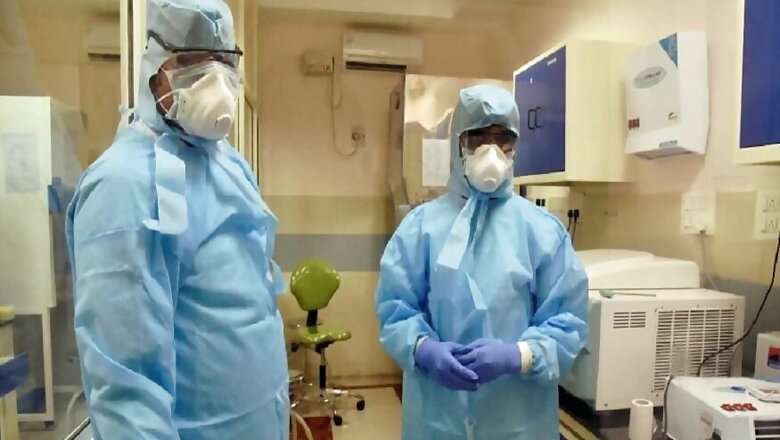
views
New Delhi: Cancer patients are a vulnerable group as they remain in immunocompromised state due to their treatment and many studies have reported a higher risk of severe outcome.
The Covid-19 crisis has strained India's already overburdened healthcare system to an extent where routine medical care is compromised to ensure prevention of spread of the infection.
The pandemic is particularly dangerous for people who are 60 or older and/or having comorbidities like hypertension, diabetes, cardiovascular and respiratory problems and cancer.
The body’s primary defence mechanism, the human immune system, is weaker in a cancer patient than in a healthy person. It simply means that immunocompromised individuals are at higher risk of being infected and to develop severe or critical form of an illness if infected.
Cancer patients are a vulnerable group as they remain in immunocompromised state due to their treatment and many studies have reported a higher risk of severe outcome, i.e., hospital and ICU admission, and deaths among them.
Immunocompromised cancer patients need to take extra precaution to prevent the spread of the novel coronavirus infection. Cancer patients, who are undergoing treatment like chemotherapy or radiation therapy, must take all necessary precautions during hospital visits.
Cancer survivors need to be cautious if they are going out for essential works. Every hospital is recommending delay or postponement of visits for cancer patients if it is not for an essential work.
Cancer patients possess higher susceptibility of community and hospital acquired infections and the novel coronavirus is a potential threat for all cancer patients. But at a higher risk are patients with certain cancer types like lung, blood related malignancies and patients of bone marrow transplantation.
Studies from China, USA and other countries show high mortality in cancer patients infected with the novel coronavirus.
Cancer patients must be informed regarding signs and symptoms of Covid-19 and trained in social distancing along with other practices to maintain hygiene.
They must continue their treatment unless they are in close contact with someone infected by the novel coronavirus or presenting symptoms of cough, shortness of breath or high temperature. A comprehensive evaluation should be performed for cancer patients when they have fever or other symptoms of infection
Use of face masks or covering is now mandatory in many states in India, which is an important step to prevent the spread of infection.
In view of limited availability of masks, Centers for Disease Control and Prevention (CDC) of the US has recommended the use of cloth face covering in public settings where other social distancing measures are difficult to maintain (for instance at grocery stores and pharmacies), especially in areas of significant community-based transmission.
At this time, there is no evidence or published guidelines regarding the use of prophylactic antiviral therapy for Covid-19 in immunosuppressed patients. Many clinical trials are ongoing on the use of chloroquine or hydroxychloroquine alone or in combination with azithromycin.
However, till now, none of these trials have been specified to cancer patients and all have been in patients with suspected or confirmed infection.
Specific guidance regarding use of hydroxychloroquine has been published by the Indian Council of Medical Research (ICMR) and it is not recommended for use without physician advice in view of associated cardiovascular complications.
Vaccines against the coronavirus are under investigation and are months away for massive immunisation. Therefore, considerable proactive precautions and strict measures should be taken by all cancer patients.
General Protective Steps for Cancer Patients
1) Stay at home and follow social distancing rules when you have to be outside.
2) No handshaking, and wash your hands with soap or apply sanitiser to them every time you touch unclean surfaces either inside or outside your home.
3) Set up a sanitising zone in your home to change clothes and shoes before stepping into other clean areas of your house, and wear separate clothes and shoes for activities outside your home.
4) Wear a face mask in crowded or small and enclosed places.
5) Eat and sleep well, which helps to keep your immune system in good shape.
6) Take abundant amounts of water and foods with plentiful protein, along with high levels of fresh vegetables and fruits.
Special Protection for Cancer Patients
1) Tell visitors not to call if they have any symptoms of coronavirus to avoid unnecessary panic.
2) Meet people in a well-ventilated room or outdoors.
3) Ask visitors to wash their hands properly.
4) Ask visitors to keep a space of at least 2 metres between you and them.
5) Keep physically active, if possible.
6) Do not isolate yourself from friends and family.
We need not confine ourselves in providing temporary remedies but strive for ensuring sustainable solutions. It is time for everyone to think globally and act locally to ensure that their intervention is relevant, appropriate, latest, and right in action.
(Dr Abhishek Shankar is Assistant Professor in Radiation Oncology at Lady Hardinge Medical College & SSK Hospital, Delhi. Dr Deepak Saini is Project Officer at Cancer Control and Prevention Division of Indian Society of Clinical Oncology, Delhi. Views expressed are personal.)














Comments
0 comment